TV industry reflects evening newspapersTV industry reflects evening newspapers
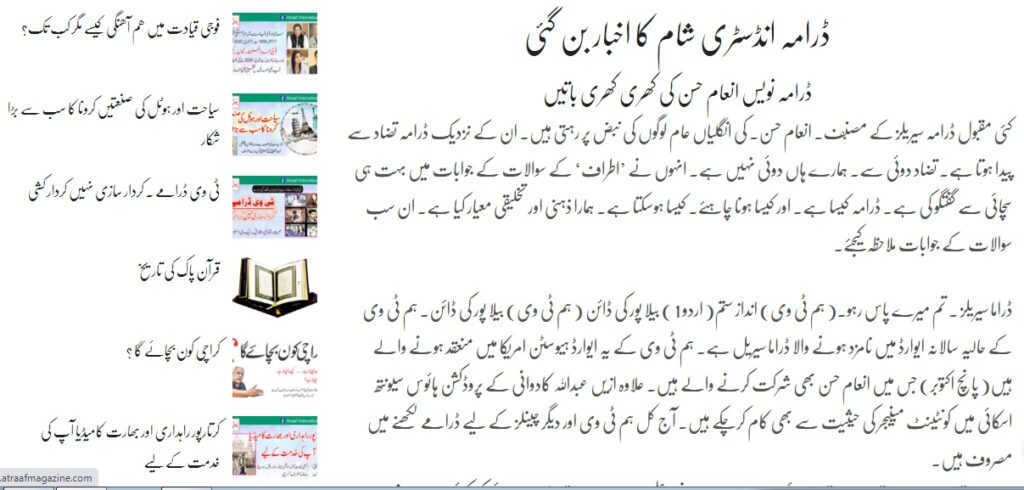
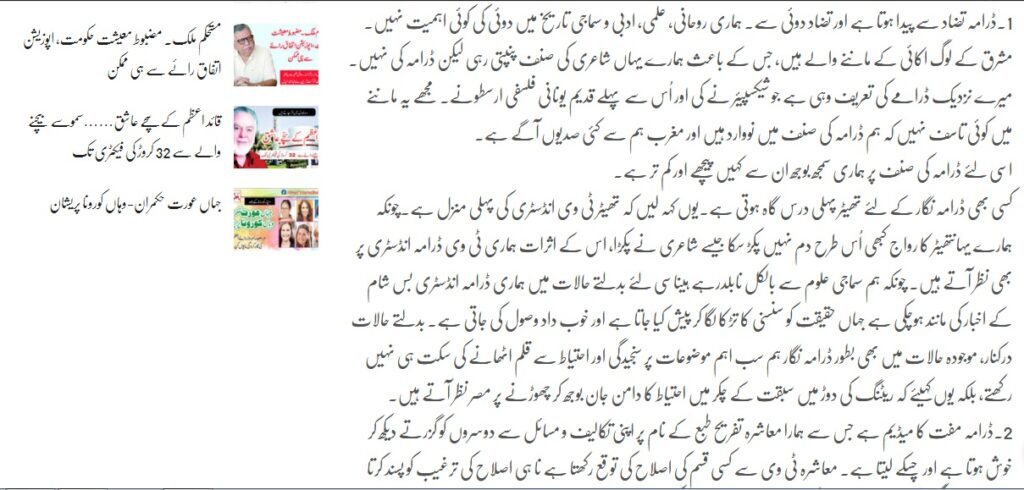
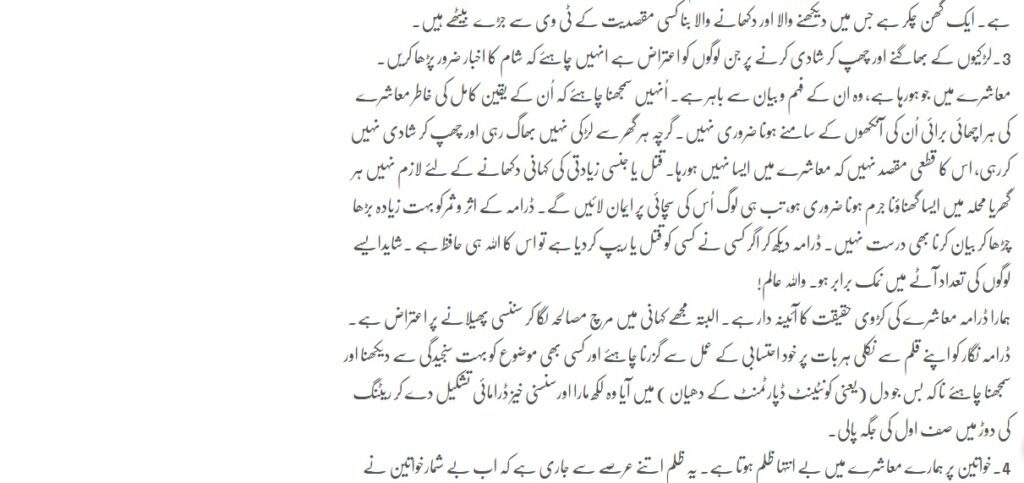
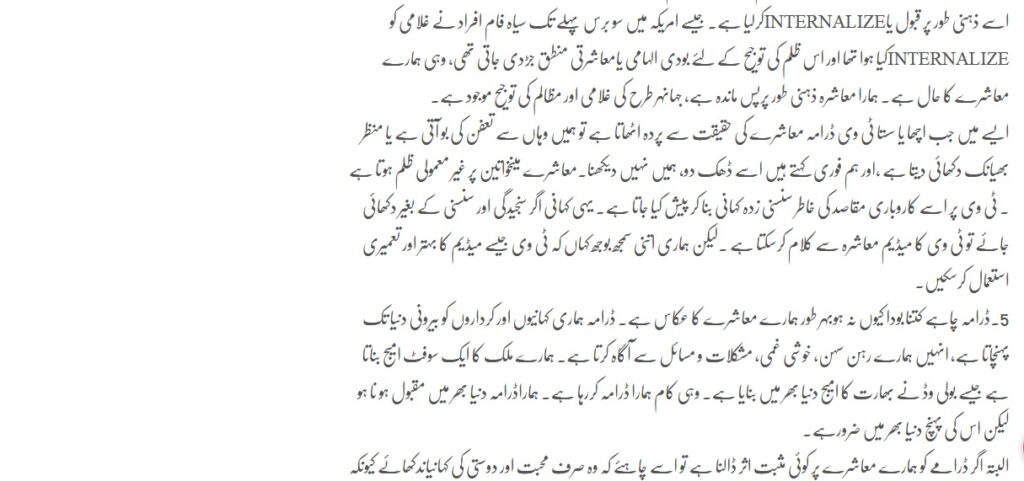






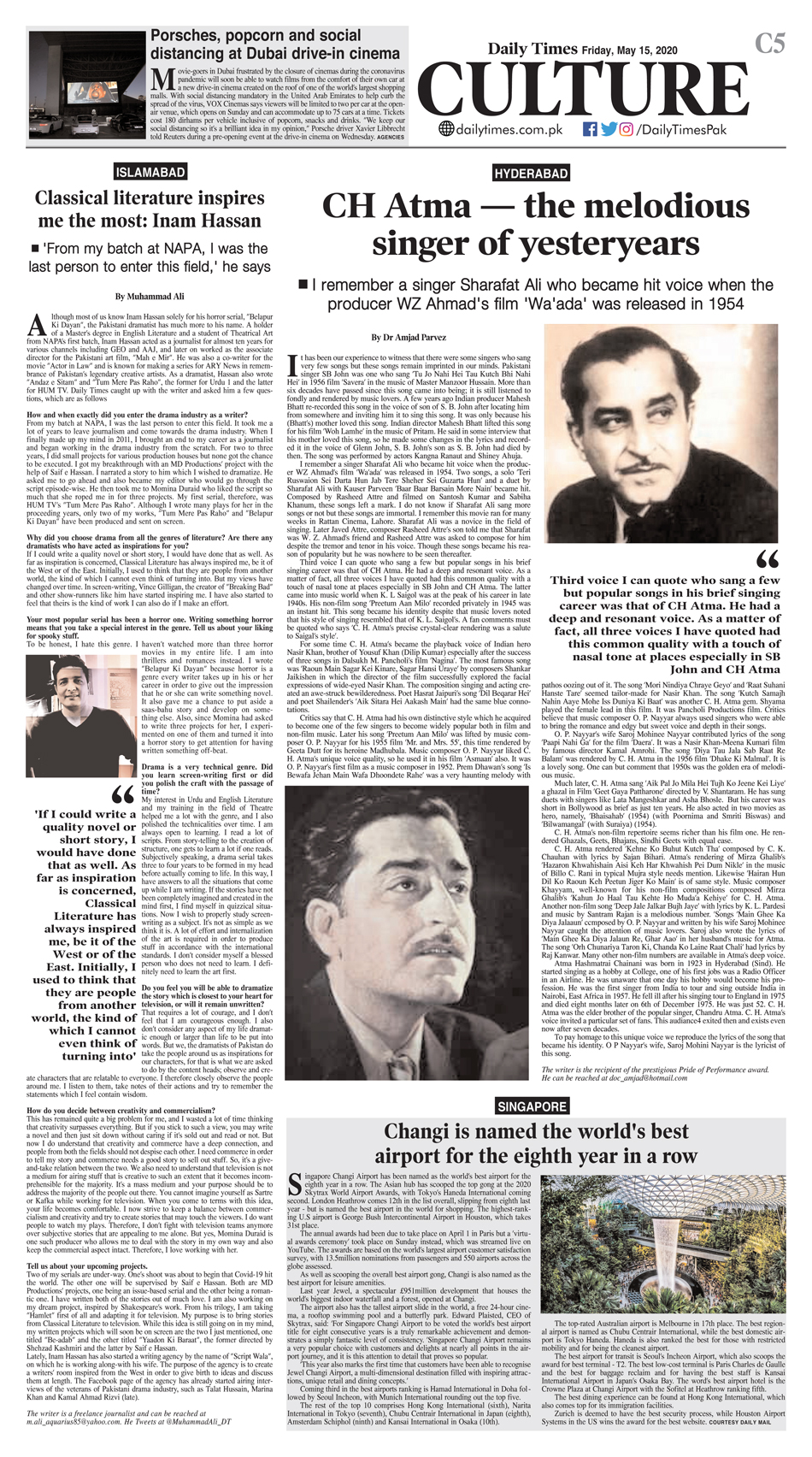
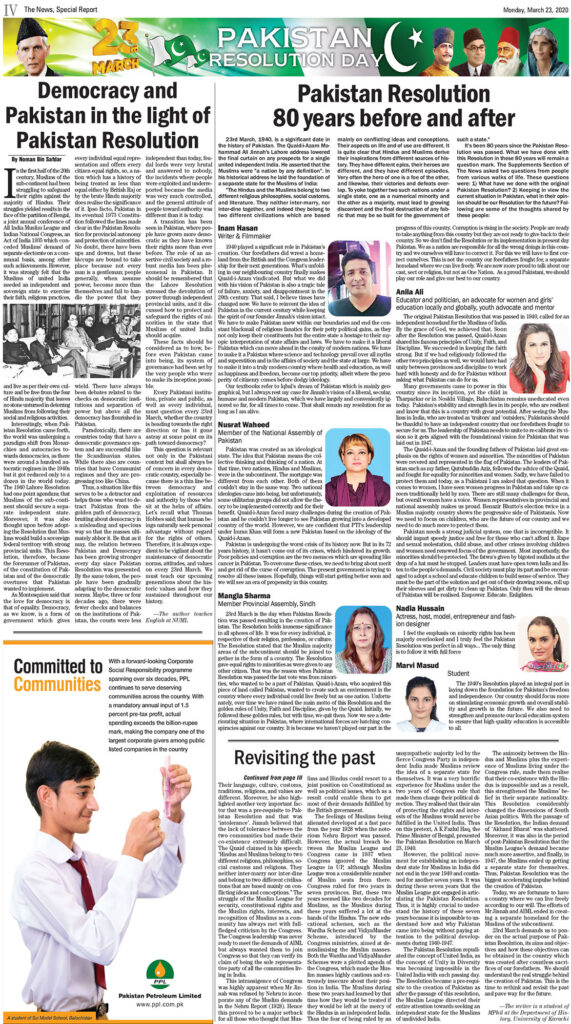
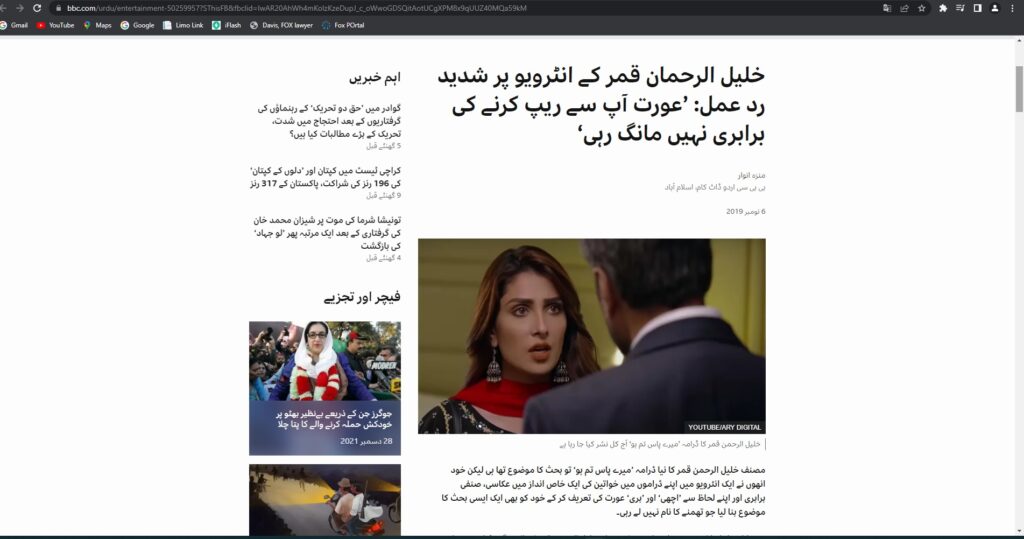

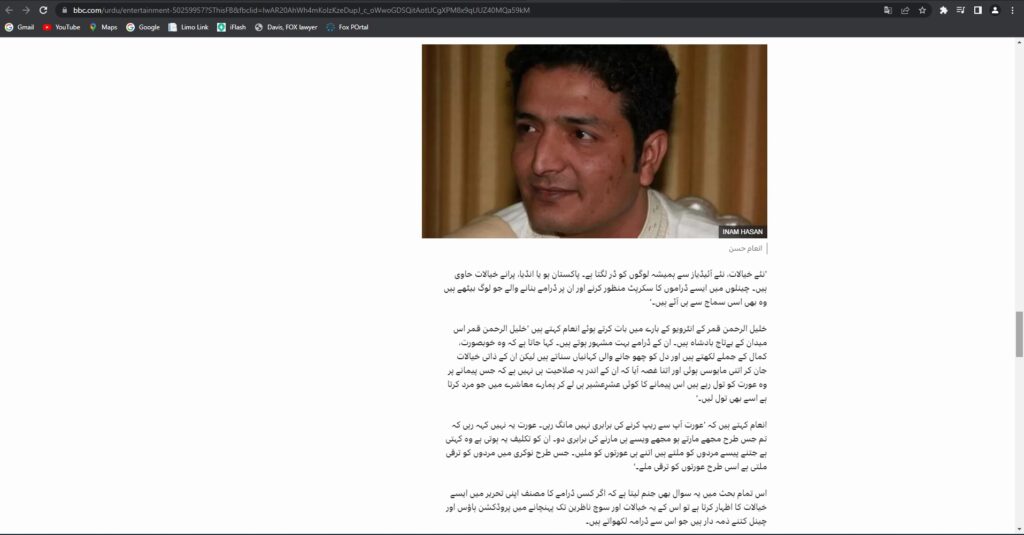
I was nominated for Best Writer for the prestigious Hum Awards (Pakistan’s answer to Golden Globe’s) back in 2019. I did not win the coveted trophy but the nomination itself was worthy of a great honor. The ceremony was held in Houston, US on October 06, 2019. Click here, here, here , here and here for its media coverage.

Kamal Ahmed Rizvi is no alien to the world of performing arts in Pakistan. One of my mentors in Theatre Arts, Rahat Kazmi once rightfully said at a private meeting that if you have to point out one name among a list of thespians in Pakistan, who made quality theatre his livelihood and staged plays most consistently and regularly, it is no one but Kamal Ahmed Rizvi. I took Mr. Kazmi’s word and later found out to my surprise that Kamal, the passionate thespian, not only adapted a number of western plays to our cultural significance and social context but also staged them successfully over the course of five decades.
Kamal Ahmed Rizvi’s association to theatre goes back to the early fifties when he was an angry young man who had migrated to Lahore after the Partition. His association with the remarkable storyteller Saadat Hassan Manto brought him to limelight when he dramatized Badshahat ka Khatima, a short story of Manto, for stage. In a few years Kamal shot to fame in literary circles of Lahore through his radio and stage plays which were widely acclaimed by the public and critics alike.
Kamal made a nationwide impact with his impeccable wit and sarcasm in Alif Noon, in which he starred with Rafi Khawar on good ol’ PTV. The duo touched the hearts and minds of both the ordinary and those who claim to be not. Penned and directed by Kamal himself, Alif Noon made a household impact across the country as did many of his other plays on television and radio. But theatre remained his first love and still is.
However there’s one man whom Kamal is usually associated with in terms of satire and sarcasm. The man is none other than Saadat Hassan Manto. To find out more about what Kamal has to say about Manto, I went to see him one fine morning. Sitting in his drawing room that holed up a number of paintings and art works, I was taken by surprise because the frail look of his age does not match with the shine of his eyes when he speaks of Manto. Here is what the old but witty thespian has to share.
TNS: What was Manto like?
Kamal Ahmad Rizvi: Manto used to wear white Uchcan, very cleanly knitted. Never a spot of dirt I found on his clothes. He used to hire a horse cart everyday from morning till evening, to collect funds from his friends for his pint of alcohol for the night. I never saw him being greedy over it as the moment he had collected the money for the pint, he would ask the cart man to take the route back home. That was his lifestyle.
TNS: What is your association with Saadat Hassan Manto? How did it begin?
Kamal Ahmad Rizvi: I was very young when I had asked a friend from Radio Pakistan in early fifties, who happened to be from Amritsar, to help me meet Manto. I was told to bring a bottle of whiskey along as a present for Manto since that was only way to have his acquaintance. I saved up a sum of currency to buy a pint of local whiskey, caught up with my friend and went to meet him one day at a house located near Dayal Singh College in Lahore. We entered from backdoor of the house, because the front door had been looked from outside to make it look like an abandoned place. As I was introduced formally, Manto inquired about why I wanted to meet him. I was a nobody back then. I told him who wouldn’t like to see him in this age. He was casually looked me up, I continued: “It was a dream to meet you”, to talk to him in those days was an obsession for everyone who read literature.
TNS: What characteristics and traits did you regularly identify with his personality?
Kamal Ahmad Rizvi: Compassion and kindness . Once we were passing by the Mall Road when Manto identified a cane vendor, who had dressed up as a groom and was still selling the cane. Manto told me that the vendor would be getting married tonight. For a proof, he asked to notice his fancy clothes. I was surprized by his sheer conviction. Manto went up to the vendor, gave him all the money that he had, saying: “Go home and attend your wedding. I am buying it all today.”
On another occasion, Ibrahim Jalees and I accompanied him on the Mall Road where a shop’s opening ceremony was taking place. A large crowd had gathered around there when someone called out: Let it be inaugurated by Manto. He replied: “I don’t have whiskey today and you are taking of taking pictures, that’s not fair.” He was assured by the show owner that a bottle would soon be brought to the spot.
Later we moved on to our sitting area with Manto holding his wrapped present from the shop owner. But Manto got really surprized when he unwrapped the special present, and refused to drink when he found a Scotch whiskey from inside. We insisted that it was okay to have the best of whiskeys sometime in life. He told us this would make him cast a greedy man in the eyes of God.“Wo sochey ga key dekho main Manto ka roz intezaam karta hoon aur aaj Ingreezi dekhi, tu wo lalach kar gaya.” [God would think that Manto got greedy, even though I have managed to provide him his share of local whiskey from here and there everyday, as promised]. Manto only liked to have locally brewed alcohol all his life by the way.
TNS: It is sometimes argued that some of his short stories are loosely structured. Your comment?
Kamal Ahmad Rizvi: No, this is not right. I am not a judge or jury, but you can learn the art of writing stories from Manto any given day. His craft is flawless, his observation is knightly. His stories are eyeopener for society. At that time in modern storytelling we had Krishan Chander, Rajinder Singh Bedi, and later on, Ahmed Nadeem Qasmi. But Manto shadowed them all in his day and still does.
TNS: The Progressive Writers Movement never completely owned and recognized Manto in his life. Professor Hassan Askari also mentioned that his essays on Manto. Apparently, there were some lists issued in literary magazines which stated who belonged to the progressives and who didn’t. Why didn’t progressive writers and thinkers compliment his work with arms wide open as suggested by Professor Askari?
Kamal Ahmad Rizvi: Manto did not require that. He never did and never would. He was not interested. Period. He did wish to be told of his greatness. He simply did not care about the material aspects of his social life. Manto was aQalander in that respect. He was beyond acclaim or applause. He was indifferent to constructed literature and art for a purpose. His passion was to write stories, and stories alone.
TNS: Were there other reasons for some literary circles not liking him then?
Kamal Ahmad Rizvi: Manto had weaknesses too, like all of us. But his art of storytelling was flawless. Yes, I know that some circles did question the authenticity of some of his published stories, which very obviously were not his. The low standard of such stories was quickly identified and questioned. In fact, they were published when Manto did not have a penny to buy alcohol and had not written a story on a given date by the publisher. Thus he gave away a few stories which were left with him for correction by unknown writers. That resulted in a big hue and cry at a literary meeting.
To be honest I had also argued against one such short story published in his name. He got angry with me, but in the next few days when we met he agreed to my point of argument. However he also said: “Couldn’t they {his critics} take the story as his to have me pleased for a while, just to show some regard to a man who has given them {the Urdu literature} so many of original stories?”
TNS: Did Manto try to make an attempt, an effort to seek attention all of a sudden, to shock his readers intentionally in his stories?
Kamal Ahmad Rizvi: No, never. He did not try to do it intentionally. He just had it all so effortlessly. It is rubbish to say that he was seeking attention to say something new in a shocking manner. He just had it in him, a gifted observation coupled with a unique expression.
TNS: Do you believe he was ahead of his time?
Kamal Ahmad Rizvi: I don’t think so. He was right there in his time. Perfect time for him. He was in it, was very much a part of it. Like Dickens and Tolstoy, he held greatness. Like them he was the need of his time, which he exploited perfectly. Thus he turned into a legend. He is very much relevant for all times if you ask me.
TNS: Can we possibly say that he was the greatest storyteller of 20th century in Urdu?
Kamal Ahmad Rizvi: Possibly. But see, this is not the right way to put it. A great man remains great for all centuries and all seasons. Shakespeare’s greatness is for all times, as does Ghalib’s. Same goes for Manto.
Published in Encore, The News International, February, 2012.

Karachi is slowly becoming a hub of cultural activities despite a long-lasting wave of terror across the country. Theatre has finally been revived, cinemas are getting back, art exhibitions and fashion weeks are held, and festivals, literary or otherwise, are organized every now and then. But all of this is not helping our educated and learned people to recognize and respect intellectual property rights.
One glaring example of such a violation of intellectual property rights is Shah Sharabeel’s latest production of Bombay Dreams, currently being staged at the Arts Council Theatre in Karachi till February 20, 2011.
Shah Sharbeel is a famous theatre director who brought us Moulin Rouge last year for a successful round of houseful entertainment for four weeks under the auspices of Centre Stage Productions sponsored with millions of rupees by a private cellular company. But this time around, he went one step ahead as he launched and advertised Bombay Dreams by boasting himself as its director and the Oscar-winning A R Rahman its music composer.
Bombay Dreams was basically a production of Andrew Lloyd Webber, who had based it on a book by Meera Syal and Thomas Meehan. A R Rehman composed its music and Don Black penned the lyrics. The first production of Bombay Dreams opened in 2002 in London, and later it became a Broadway success story.
However, Mr. Sharabeel misguided his audiences by portraying it as if he had managed to have Rehman on board for the score of his adaptation of the play. According to media reports, he admitted he did not have the permission of either A R Rehman or Really Useful Group (Rug), which owns the copyright of Bombay Dreams. But Jo Preston, a Rug official, has been reported of initiating a legal case against Centre Stage Productions
All of this does not change the fact that Pakistan is a member of World Intellectual Property Organization, and thus the latter requires Pakistan government to take measures against the violation of intellectual property rights. The World Trade Organization (WHO) also requires of its members to ensure copyrights and curb those who are found guilty of violating them.
Nevertheless, having intellectual property laws should not be enough. They must be enforced to protect artists from piracy and unauthorized use of their artistic creation worldwide. Thus, WTO has in place an international agreement known as Agreement on Trade Related Aspects of Intellectual Property Rights (TRIPS), which says (in Part 3): “Governments have to ensure that intellectual property rights can be enforced under their laws, and that the penalties for infringement are tough enough to deter further violations.”
Having known the penalties of such violations, the learned director of now-pirated Bombay Dreams, Shah Sharabeel, continues to stage the production. He’s also on record saying: “Pakistan is a third world country, probably like Uganda to A R Rahman, why would he even care that he is being given credit or not?” Obviously, why would Rehman care! But Shah Sharbeel should have cared before plagiarizing the play and using Rehman’s stardom to his own fortune. This is also evident of how the famous director views the laws of the very country he lives in. And rightly so, because the Intellectual Property Organisation of Pakistan and other concerned officials, from tax to censor departments have apparently turned a blind eye to this case of piracy, which explains a lot about the culture of piracy in our country.
Published in The News International (Op-Ed), February 11th, 2011.

The so-called city of lights did have plays on and off before, but the establishment of Napa made the theatre movement what it is today – a series of full acts with no intervals.
The National Academy of Performing Arts (Napa) was inaugurated in February, five years ago by then President General Pervez Musharraf. Run by acting veteran Zia Mohyuddin, the academy churned out its first batch of more than 40 students in theatre arts and around 20 students from its music department in 2005. However, almost 50 per cent of the students enrolled in both departments fail to cope with the four to five hours long class schedule and drop out. The consequence is that only around 20 to 25 of Napa’s first batch graduated with a diploma or a certificate in hand. The ratio of graduating students decreased with the next batch, and the problem continues to haunt the academy’s administration.
Since its inception, the academy has been through various highs and lows. It faced a lack of funds for almost a year (from July 2008 to June 2009) when the current PPP-led federal government cut their grant short — from Rs50 million to a mere Rs17 million. The grant was restored in the next fiscal by order of Prime Minister Gilani.
The academy is also in court with a stay order in hand, to fight a case to retain its premises, the Hindu Gymkhana. The case began when Napa was served a notice to vacate the premises by the Sindh government last year. It said the Napa administration made changes to the architecture of the historical place by erecting pillars of its in-house theatre which is under construction off the main building. It is interesting to note that the provincial government also receives its monthly rent from the academy.
The fresh roots of theatre culture in Karachi owe a great deal to prominent Karachiites such as Sheema Kirmani, Khalid Ahmed, Sania Saeed and Nida Butt. With their respective theatre groups these individuals have led the theatre scene into a direction where bomb blasts and ethnic clashes were responded to by realistic plays on the stage. But the establishment of the Napa Repertory Theatre Company (NRTC) appears to have over shadowed all things non-Napa. It has staged more than a dozen first-rate productions within two years.
Established, organised and run under the supervision of Rahat Kazmi, the NRTC kicked off in April 2008 with an adaptation of Shakespeare’s King Lear. Adapted by maestro Aga Hashr as Sufaid Khoon the play was the company’s first and most expensive production. NRTC recruited 13 students from its first batch of graduates on a decent monthly salary, following the tradition of national theatre academies across the world. But it sacked them all in February 2009. Now the NRTC hires their services, if deemed necessary, for each upcoming production. A few graduates feel this practice is inappropriate and unjust
When Napa started off faculty were not experienced in formal teaching. They included well-known theatre and TV artists but only a few of them had training. Arshad Mehmud, Director Programs at Napa says “Initially, we didn’t have proper texts and curriculum for either the music or theatre arts faculties. After a lot of hard work and experiments, we now have a complete curriculum in place. This is our biggest achievement so far.”
Is the Napa faculty happy with what they have produced in the field of acting? “Now that I look at the work our graduates are doing in the media, I feel we have done something good. You can see our first batch, which is by far the best, doing good work,” Mahmed says. Saqib Khan, Rabab Hashim, Paras Masroor, Ali Rizvi, Uroosa Masroor, Aimen Aly, Mohsin Ali and a few others are now making waves across our TV screens and on stage. Taal Karisma, a band formed by Napa music graduates appears to be the latest big act on the music scene.
With only a handful of resources and a passion to see the culture of performing arts flourish, the Napa administration now dreams of forming a national orchestra, says Mehmud. “Almost every country in the world has a national orchestra. Even the Sultanate of Oman! It may take us ten to fifteen years. But I have a dream to give Pakistan a symphony orchestra, which would by far be our greatest achievement.”
Arshad Mehmud also hopes to start a students’ exchange program with performing arts institutes and academies abroad.
Published in The Express Tribune, July 16th, 2010.

Syed Ali Shah, known as “Bacha’’, the respected one, amongst the slum-dwelling Pakhtuns of Karachi’s Sherpao Colony, has produced, acted and directed numerous video films, street theatre plays, and comedy shows for the slum locals. They are available in the colony’s video shops at an affordable price for rental. His vision has not translated to material success, but, as triumphs of the human spirit go, Bacha’s story stands alone for not surrendering to the inexorable misery of grinding poverty.
Born in Swat to a family of landless peasants in 1954, Bacha’s life seemed condemned to being unremarkable. After years of struggle, his father realised in 1963 that his family had no hope for survival in Swat and would have to migrate to Karachi to scrape out a living, or, as Bacha says, with customary lyricism, “My family moved to Karachi to try to survive the pangs of life.”
A few years after his arrival, as a young teen, Bacha discovered his passion for Pushtu and Urdu films and with this in mind, he decided to participate in local street theatre, “I decided to become an actor. I was the first, and thus far the last in my family, to have such a dream.”
In his youthful days, his passion invited praise and criticism alike. Staunchly religious members of his community predictably criticised his aspirations, but he never paid much attention to them. He had enough friends and supporters who paid them no heed either. “They believed entertainment was not good for society,” he says, “that it would ruin young minds. We disagreed, and discussed the matter with our audiences in our own way. As we continued to do this, eventually our critics got tired of talking about us.”
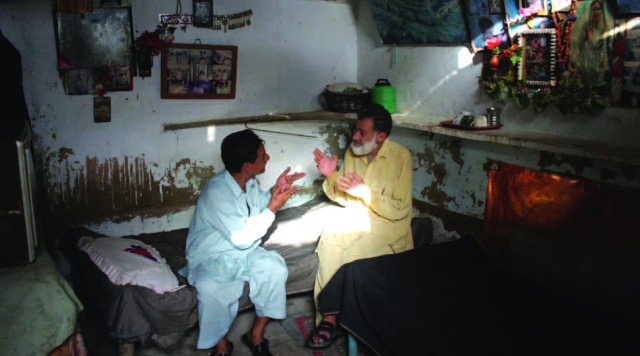
Bacha’s room is decorated with pictures of Zulfikar Ali Bhutto, Benazir Bhutto and Nawab Akbar Bugti, in addition to some Pakistani film posters and friends’ photographs. He seems comfortable and at peace, for this is where he comes back after spending a hectic day every evening. “This is where I like to be — this room. This is where my friends and other people come to meet me. In other words, this is my little world.” He takes out his little keyboard and starts playing a jaunty Pushto tune on it, smiling.
While Bacha conspicuously finds joy in the smallest things, the highlight of his life by his own reckoning, was the time he got the opportunity to deliver a line in the Urdu film Pehchaan, starring cinematic icons Nadeem and Shabnam. “I was in Lahore when I got this chance by luck. I had to deliver a line ‘ye aurat badkirdaar hai’ (this woman is of bad character). I would have got more work in films, if I had not gone back home because of an emergency. Life is tricky; I lost a golden chance,” he says.
Discussing his starring scene in great detail, and none too fussed that it involved a crowd of men shouting derogatory remarks at a woman, Bacha all but re-enacts his moment of greatness in Pehchaan. He delivers the line with all the emotionally charged passion that he had gathered while delivering it the first time, during the shooting all those years ago. He said that in the late ’80s, he had wished to return to Lahore and look for more work in this field but that he had been compelled to abandon the love of his life due to his mother’s belief that cinema was unIslamic and that his involvement with it was not fitting for their family nor community. And it was in adherence to these traditions and values that Bacha, unquestioningly, gave up the thing he most wanted. His mother, now old and infirm, still considers it a matter of pride that her son bowed to her will rather than living his life.
Despite this blow, Bacha never lost hope. His passion and inspiration found different routes, and he gave to other young people the hope that his own elders had denied him. In the colonies in which he lived, he made a name for himself by encouraging young Pushtoon labourers to come forward and narrate and act out their tales and entertain their friends and neighbours. His method was simple. He would orate his own story. Sometimes, he would tell them about prominent actors from Pushto films he had met. This being greater encouragement than these slum dwelling young men had ever known, made a crucial difference in some of their lives.
Now, there are a number of aspiring actors you can find in this slum. They credit Bacha with igniting in them a desire to act. Bacha tells them how to write a story for stage, besides helping them in rehearsals, whenever needed. “He is my guru and my inspiration,” says 18-year old Fayyaz Pardesi, whose parents forcibly made him marry when they found out last year that he was in Lahore, looking for an opportunity to work in Pushtoo films.
When asked if he ever got an opportunity to work in a film, Fayyaz said: “No. I worked in Lahore as a labourer and looked for an opportunity. But I never got one and then came back home after six months.” However, all of this isn’t enough to hold him back. He seemed determined, as he said: “I will give it another shot this year. I am planning to visit Lahore in a few months. I am very keen to work in films.” In the colony, Fayyaz’s friends joke: “The student tried to follow the footprints of his guru and got busted on his way. Isn’t it funny?”
Fayyaz now works with Muhammadzada, a scrap vendor and father of six. He runs a street theatre group in the vicinity. Muhammadzada and his friends stage different stories based on social issues and problems concerning their slum life at a nearby playground every Friday. Fayyaz usually plays the female lead, because, as in Shakespearian times, Muhammadzada cannot recruit a woman to do the job.
It’s important to not look at this in terms of financial gain. To have a dream, to hold on to it, that is enough of a victory in lives like Bacha’s, which defy our notions of success and failure. Bacha’s father was a labourer who worked himself to death for a pittance in textile factories. He was a die-hard Bhutto fan, as is Bacha, but when he died, he left a verbal will for Bacha and his six brothers. “My father believed the Bhuttos were real sympathisers of the poor in this country. So he had advised us to vote for PPP till the last member of the Bhutto family is alive and leading the party. So I follow what he said, despite my reservations about what the current PPP government stands for,” he said. Ironically, his father’s advice and his mother’s oath are enough an evidence of how his family bond has determined, most of the time, his choices in life.
Since Bacha is an entertainer and a good anchor, he is regularly invited by political activists in the area to motivate their voters, to campaign for them. He addresses political functions, puts up acts at their gatherings, and thus motivates the locals to vote. He has a theatrical voice and an engaging manner of reciting poetry as well, both qualities that have kept him popular with activists.
When not indulging his passion, Bacha can be found selling candies at a stall in Sherpao Colony. He cannot tell you who Laurence Olivier was or who Al Pacino is, but he has, in his own way, inspired those around him to the art of acting in a similar way to these thespians, with far more remarkable odds to be faced along the way.
Published in The Express Tribune, July 11th, 2010.

People don’t dream anymore. They don’t want change: neither do they want to change nor they wish to have a change in either social or personal sphere of their life. When addressed and debated, they either come across as pessimistic viewers or frustrated speakers; however those who are neither of them are taunted as confused — I believe I am one of them.
I have no regrets of being confused even though I am often taunted as being a member of an apolitical ‘minority at loss’ by a larger section of this society. Yes, I am confused and apolitical. Because I am left with nothing but choose between two worldviews, which stand poles apart and are represented by two extraordinary people: Obama and Osama (both are misters, of course). Thus I am confused because I have to, mind you that I just have to, choose between either of them — I don’t even have a choice of not choosing in the first place.
Thus I am at crossroads: if I stand by Mr. Obama and appreciate his promises to make this world a realization of the American dream, I am threatened, and likely, to be either killed at the hands of a suicide bomber or kidnapped by Taliban militants. On top of that, I will be condemned by right-wing organizations, while their not-so-friendly leaders will openly call me, indeed the most demeaning of all, liberal.
On the contrary, if I choose the other bloc, albeit Mr. Osama’s, the next minute I will definitely be either going down in a drone attack or picked up by local or foreign security agents who have been tasked with transporting me to a postmodern concentration camp, the facility of Guantamano or at Kandahar Base, where decency of modernity that Man once held high with proud for the past few centuries has been lost at a whim.
Therefore, I resign; I choose not to choose no matter what the consequence; I defy this vulgar choice that today’s world politics, designed for wars and famine, leaves me with. Because, on both hands, it’s just blood and bones alongside bullets and ballistic missiles. I don’t want it — all of it.
Still, I stand opposed to nothing but war and its most notorious terminology ‘war on terror’. Be it from any side, Obama or Osama’s, I stand opposed to it. Because both of them are running free and wild on this earth, delivering messages and smiles, with their respective weapons — their missiles, their suicide jackets, their allied soldiers, their suicide bombers. But I, like billions of other citizens of this world, am living a caveman’s life where fear is my primal source of companionship.
That they are free and I am not; that they have fun and I don’t; and that they are living and I will be killed by either of them has led me believe otherwise. Thus I oppose to oppressors — wherever and whoever they are — their deeds, their actions, their policies and their plans — whatever they are. Because they are all the same, the warmongers.
Then who is it that I am with? What is it that I want? What is it that I represent? Where are those who can stand up for me? Where are my people? Where are the dreamers?
To begin with I represent those who hate the sight and thought of blood and who are confused — yes, confusion is the first step towards progress these days. So this clan of people that I represent also has to wish and to dream besides being confused in the first place. They have to dream of a world; it’s going to be a world where peaceful resistance is the answer, meaning a dream of waging a struggling for a world where wars and battles, suicides and bombers, and most of all, Obamas and Osamas will be part of a later-century fairytales, likely to be loved by school children. Despite giving our stories a good read, those children will fear these days and wish these monsters, of wars and of terror, don’t invade their peaceful world as self-righteous attackers.
Thus I dream today as a representative of an alternate world for tomorrow. But how’s that possible? I recall I have been told to make a choice only from the given choices: yes, once again, between Obama and Osama, the representative of today’s split world. But I stand by neither of them and that they both operate in and influence the current system — the free market of all commodities including arms, oil and men — I am inclined to think if it is right to just stand up against these two individuals who now appear to be mere puppets of the very system they represent and live in.
You can clearly see I am confused, but I am thinking. And that’s progress.
Published in The News International (Op-Ed) in July , 2010.